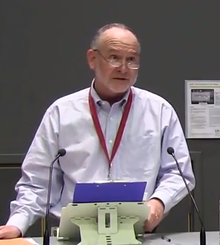Loading AI tools
American anthropologist From Wikipedia, the free encyclopedia
James Ferguson (born June 16, 1959) is an American anthropologist. He is known for his work on the politics and anthropology of international development, specifically his critical stance (development criticism). He was chair of the Anthropology Department at Stanford University.[2] His best-known work is his book, The Anti-Politics Machine. He delivered the most prestigious lecture in anthropology, the Morgan Lecture, in 2009, for his work on basic income. He earned his B.A. in cultural anthropology from the University of California, Santa Barbara and an M.A. and Ph.D. in social anthropology from Harvard University.[3]
James Gordon Ferguson | |
|---|---|
 Ferguson at the University of Sussex, July 2016 | |
| Born | June 16, 1959[1] |
| Nationality | American |
| Occupation(s) | Professor, scholar |
| Title | Susan S. and William H. Hindle Professor in the School of Humanities and Sciences[2] |
| Academic background | |
| Education | B.A., M.A., Ph.D. |
| Alma mater | University of California, Santa Barbara, Harvard University[3] |
| Thesis | Discourse, knowledge, and structural production in the "development" industry : an anthropological study of a rural development project in Lesotho[4] (1985[4]) |
| Academic work | |
| Discipline | Anthropologist |
| Sub-discipline | Development studies |
| Institutions | Stanford University (2003 - ) University of California, Irvine (1986-2003)[3] |
| Main interests | Political economy, Development studies, Migration[3] |
Seamless Wikipedia browsing. On steroids.
Every time you click a link to Wikipedia, Wiktionary or Wikiquote in your browser's search results, it will show the modern Wikiwand interface.
Wikiwand extension is a five stars, simple, with minimum permission required to keep your browsing private, safe and transparent.